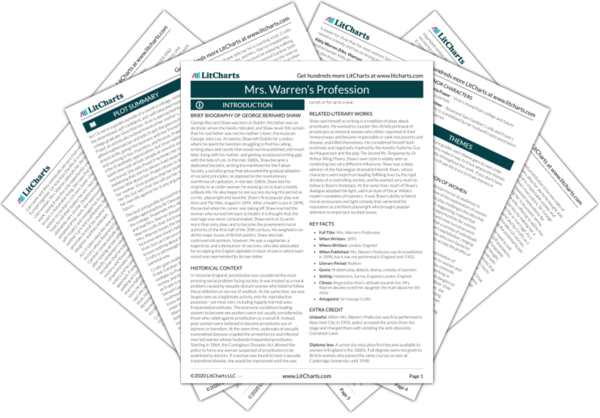Brief Biography of George Bernard Shaw
George Bernard Shaw was born in Dublin. His father was an alcoholic whom the family ridiculed, and Shaw never felt certain that his real father was not his mother’s lover, the musician George John Lee. At twenty, Shaw left Dublin for London, where he spent his twenties struggling to find his calling, writing plays and novels that would not be published until much later, living with his mother, and getting occasional writing gigs with the help of Lee. In the mid-1880s, Shaw became a dedicated Socialist, writing the manifesto for the Fabian Society, a socialist group that advocated the gradual adoption of socialist principles, as opposed to the revolutionary overthrow of capitalism. In the late 1880s, Shaw lost his virginity to an older woman; he would go on to lead a mostly celibate life. He also began to see success during this period as a critic, playwright and novelist. Shaw’s first popular play was Arms and The Man, staged in 1894. After a health scare in 1898, the period when his career was taking off, Shaw married the woman who nursed him back to health; it is thought that the marriage was never consummated. Shaw went on to write more than sixty plays and to become the preeminent moral authority of the first half of the 20th century. He weighed in on all the major issues of British politics. Shaw also had controversial opinions, however. He was a vegetarian, a eugenicist, and a denouncer of vaccines, who also advocated for scrapping the English alphabet in favor of one in which each sound was represented by its own letter.
Historical Context of Mrs. Warren’s Profession
In Victorian England, prostitution was considered the most pressing social problem facing society. It was treated as a moral problem caused by sexually deviant women who failed to follow the prohibition on sex out of wedlock. At the same time, sex was largely seen as a legitimate activity only for reproductive purposes—yet most men, including happily married ones, frequented prostitutes. The economic conditions leading women to become sex workers were not usually considered by those who railed against prostitution as a social ill. Instead, poor women were believed to become prostitutes out of laziness or boredom. At the same time, outbreaks of sexually transmitted diseases crippled the armed forces and infected married women whose husbands frequented prostitutes. Starting in 1864, the Contagious Diseases Act allowed the police to force any woman suspected of prostitution to be examined by doctors. If a woman was found to have a sexually transmitted disease, she would be imprisoned until she was cured, or for up to a year.
Other Books Related to Mrs. Warren’s Profession
Shaw saw himself as writing in a tradition of plays about prostitutes. He wanted to counter the clichéd portrayal of prostitutes as immoral women who either repented of their immoral ways and became respectable or sank into poverty and disease, and killed themselves. He considered himself both positively and negatively inspired by the novella Yvette by Guy de Maupassant and the play The Second Ms. Tanqueray by Sir Arthur Wing Pinero. Shaw’s own style is widely seen as combining two very different influences. Shaw was a deep admirer of the Norwegian dramatist Heinrik Ibsen, whose characters were kept from leading fulfilling lives by the rigid dictates of a controlling society, and he wanted very much to follow in Ibsen’s footsteps. At the same time, much of Shaw’s dialogue adopted the light, satirical style of Oscar Wilde’s modern comedies of manners. It was Shaw’s ability to blend moral seriousness and light comedy that cemented his reputation as a brilliant playwright who brought popular attention to important societal issues.
Key Facts about Mrs. Warren’s Profession
-
Full Title: Mrs. Warren’s Profession
-
When Written: 1893
-
Where Written: London, England
-
When Published: Mrs. Warren’s Profession was first published in 1898, but it was not performed in England until 1902.
-
Literary Period: Realism
-
Genre: Problem play, didactic drama, comedy of manners
-
Setting: Haslemere, Surrey, England; London, England
-
Climax: Angered by Vivie’s attitude towards her, Mrs. Warren decides to tell her daughter the truth about her life story.
-
Antagonist: Sir George Crofts
Extra Credit for Mrs. Warren’s Profession
